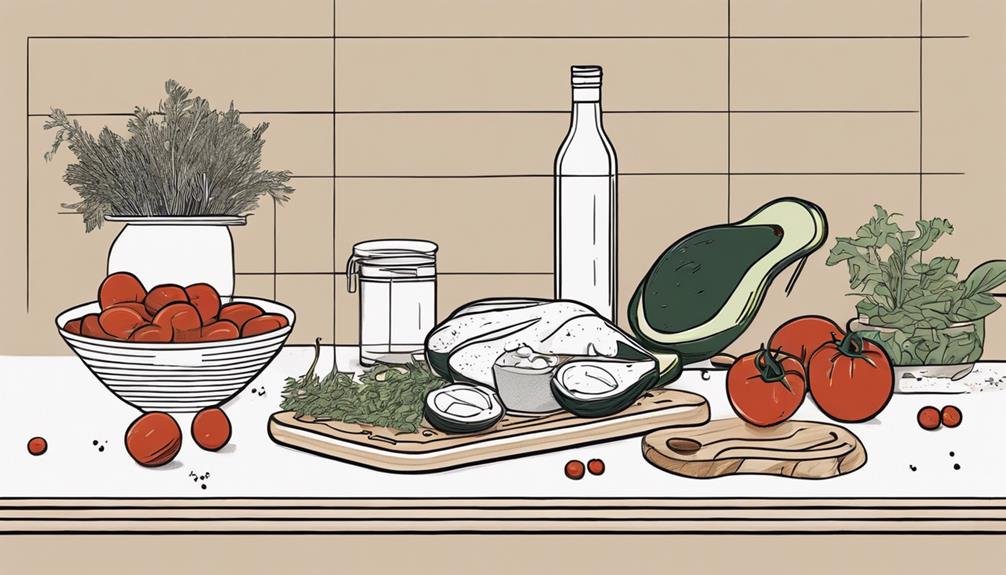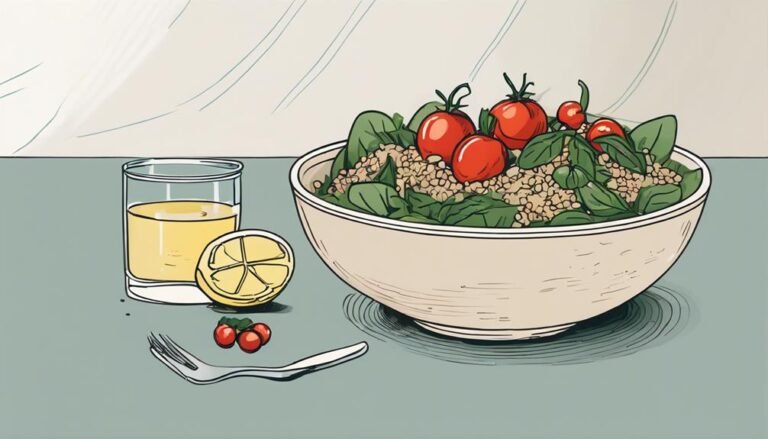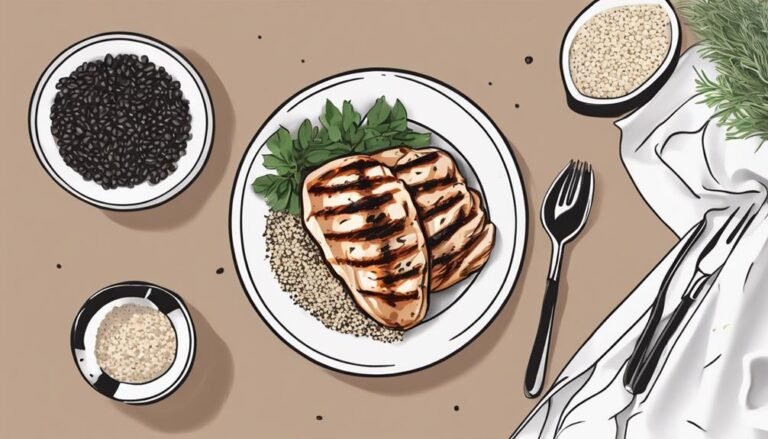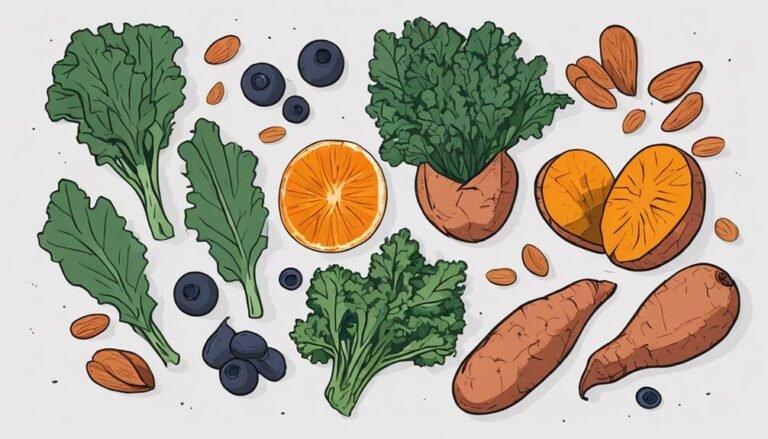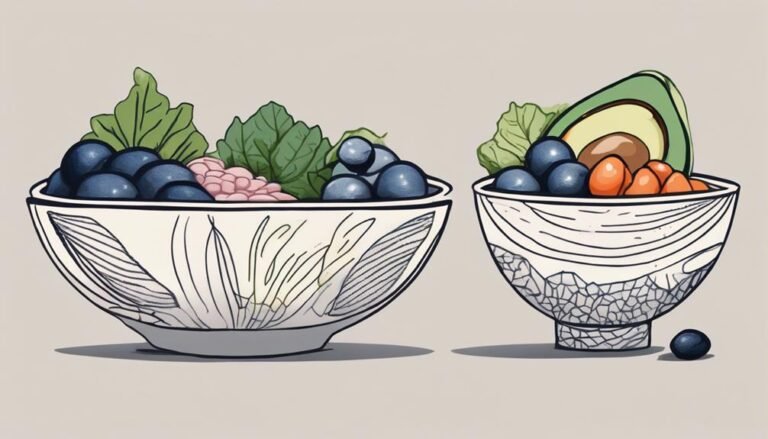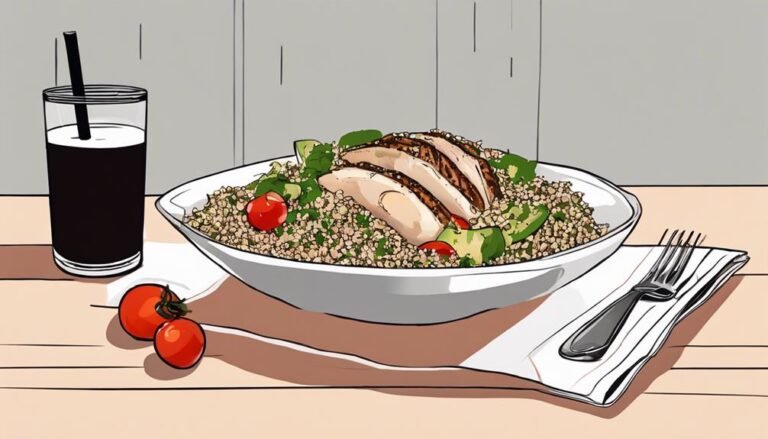What Should 40+ Men Eat for Easy Meals?
As a man over 40, you need quick and nutritious meals that fuel your energy and support your health. Focus on lean proteins like chicken or fish, plenty of colorful vegetables, and whole grains such as quinoa or brown rice. Easy options include stir-fries, one-pan dishes, or overnight oats. Don't forget healthy fats from avocados and nuts—they're great for heart health. Practice portion control with smaller plates and keep hydrated. Meal prep on weekends can save you time during the week, ensuring you'll always have something balanced on hand. Stick around to discover more helpful tips for your meal planning!
Key Takeaways
- Prioritize lean proteins like chicken, fish, and legumes to support muscle maintenance and overall health.
- Incorporate a variety of colorful fruits and vegetables for essential vitamins and antioxidants.
- Choose whole grains such as quinoa and brown rice for sustained energy and fiber.
- Prepare quick recipes like stir-fries and salads to save time and promote healthy eating.
Importance of Meal Planning
Meal planning is essential for ensuring you consistently eat healthy and balanced meals that support your lifestyle.
By taking the time to plan your meals, you can save yourself from last-minute decisions that often lead to unhealthy choices. You'll have a clearer picture of what you need to buy, making grocery shopping quicker and more efficient.
Plus, planning helps you manage portion sizes, which is important as metabolism changes with age. It also allows you to incorporate a variety of foods, preventing boredom and promoting nutritional diversity.
Nutrient-Rich Food Choices

Choosing nutrient-rich foods is essential for maintaining your health and energy levels as you age, so focus on incorporating a variety of fruits, vegetables, lean proteins, and whole grains into your diet.
Opt for colorful fruits and veggies, as they provide essential vitamins and antioxidants.
Lean proteins, like chicken, fish, and legumes, support muscle maintenance and repair.
Whole grains, such as quinoa, brown rice, and oats, offer sustained energy and fiber, promoting digestive health.
Don't forget healthy fats from sources like avocados, nuts, and olive oil, which can boost heart health.
Quick and Easy Recipes
Whipping up quick and easy recipes can help you maintain a nutritious diet without spending hours in the kitchen.
Start with a stir-fry using lean protein like chicken or tofu, adding in colorful veggies and a splash of soy sauce for flavor.
Another great option is a one-pan salmon dish; just season the fish with herbs and bake it alongside asparagus or broccoli.
For breakfast, try overnight oats—combine rolled oats with yogurt, chia seeds, and your favorite fruits, and let it sit in the fridge.
Finally, don't underestimate the power of a hearty salad. Toss mixed greens with canned beans, cherry tomatoes, and a simple olive oil dressing for a satisfying meal.
These recipes keep you energized and healthy!
Portion Control Tips
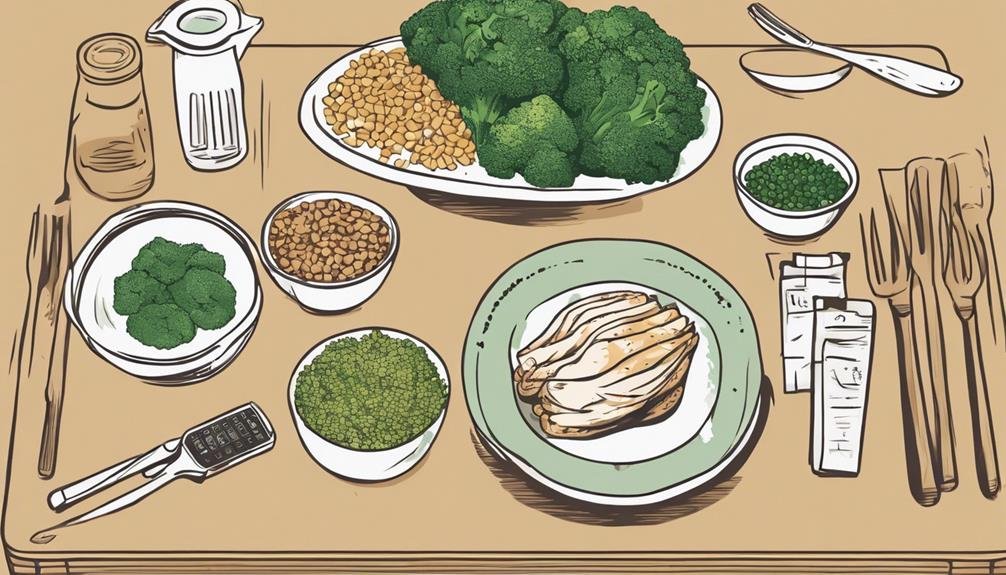
Maintaining a balanced diet isn't just about what you eat, but also how much you serve yourself, so mastering portion control can be a game changer for your health.
Start by using smaller plates; this simple trick can trick your brain into thinking you're eating more. Aim to fill half your plate with vegetables, a quarter with lean proteins, and the remaining quarter with whole grains.
Don't eat straight from the bag or box; instead, portion out snacks into small bowls. Pay attention to hunger cues—eat when you're hungry, but stop when you're satisfied.
Meal Prep Strategies
Effective meal prep can transform your weekly routine, making it easier to stick to healthy eating habits.
Start by choosing one day a week—like Sunday—to prepare your meals. Pick recipes that are simple and nutritious, focusing on lean proteins, whole grains, and plenty of vegetables.
Batch-cook large portions and divide them into individual containers for grab-and-go convenience. Don't forget to label your meals with dates to guarantee freshness.
Consider investing in quality storage containers that are microwave and dishwasher safe. Also, incorporate a variety of flavors to keep things exciting.
Staying Hydrated and Active

After prepping your meals, don't overlook the importance of staying hydrated and incorporating regular physical activity into your routine.
Aim to drink at least eight 8-ounce glasses of water daily, adjusting for exercise and climate. Staying hydrated boosts your energy levels, aids digestion, and supports overall health.
As for activity, find exercises you enjoy—whether it's walking, cycling, or swimming. Aim for at least 150 minutes of moderate aerobic activity each week, combined with strength training. This not only helps maintain muscle mass but also improves metabolism.
Don't forget to stretch and stay flexible, too. By prioritizing hydration and staying active, you'll enhance your physical and mental well-being, making it easier to stick to your meal prep plan.
Questions
What Are the Best Snacks for Men Over 40?
For men over 40, the best snacks include nuts, Greek yogurt, and fresh fruit. These options provide essential nutrients, boost energy levels, and satisfy cravings without added sugars or unhealthy fats. You'll feel great!
How Can I Incorporate More Fiber Into My Diet?
Imagine a garden bursting with colorful fruits and veggies. To boost your fiber intake, add beans, whole grains, nuts, and plenty of fresh produce to your meals. It'll keep your digestive system thriving and happy!
Are There Specific Foods That Boost Metabolism for Men?
Yes, certain foods can boost your metabolism. Incorporate lean proteins like chicken and fish, spicy foods like chili peppers, and whole grains. Don't forget to hydrate with water, as it plays a key role too!
What Are Some Budget-Friendly Meal Options for Busy Men?
Did you know that over 70% of men struggle to find budget-friendly meals? You can whip up quick options like stir-fried veggies with rice, canned soups, or bean salads that won't break the bank.
How Can I Reduce My Sugar Intake Effectively?
To reduce your sugar intake effectively, start by reading labels, swapping sugary snacks for fruits, and cutting back on sugary drinks. You'll feel better overall and likely notice improvements in your energy levels.
Conclusion
By focusing on nutrient-rich foods and easy meal prep, you can simplify your eating habits and boost your overall health.
Remember, it's not just about what you eat but also how you plan and portion your meals.
So, why not take a few moments each week to map out your meals?
You'll find that with a little effort, you can enjoy delicious, healthy dishes that fit your lifestyle, keeping you energized and feeling great every day.

